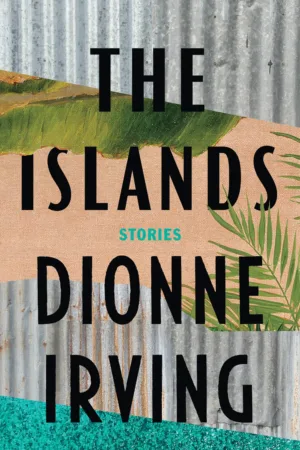The Islands
by Dionne Irving
reviewed by Victoria Zhuang
Jamaican-Canadian writer Dionne Irving’s first short story collection, The Islands, feels particularly timely as the world emerges from a global pandemic that turned everyone into islands of their own. The stories form a kind of archipelago of ten far-flung souls from the Jamaican diaspora, disparate-yet-kindred spirits. The Islands has echoes of Jhumpa Lahiri’s tour de force collection Unaccustomed Earth, with a more satirical postcolonial edge, as well as a Raymond Carver-like bluntness.
Following her debut novel Quint about real-life Canadian quintuplets who were put on display for tourists, Irving continues to explore themes of family, belonging, womanhood, and power, approaching them here through the lens of race and migration. Whether they’re in Canada, London, Panama, Paris, or the US, her mostly female characters appear well integrated. They bear the trappings of assimilation: clothes, mannerisms, jobs, marriages. But despite moving from one continent to another, and in some cases growing up as second-generation “natives” in their new land, Irving’s protagonists are still psychologically in transit. A sense of arrival eludes them, just as their homelands, like so many former colonial states, have yet to reach a sense of closure after decolonization.
But Irving’s people also disturb their adoptive homelands with demands for acceptance; many of them are stalled writers, like Irving, who don’t fit into set boxes of identity; they seek to rewrite history in their own voices. There’s the self-assured couple in “Florida Lives” who watch their “Black millennial marriage” run aground in their new tropical home when the husband, who was raised to prioritize Black excellence and a certain vision of status, can’t relate to his Jamaican wife’s need for togetherness and community. The titular character in “Shopgirl” despises her parents for making her help out in the family’s ethnic food shop while she tries reading books like Oliver Twist, but later wields her heritage as a bittersweet piece of cultural capital. In “Weaving,” Delroy, a washed-up boxer whose white ex-wife raises their daughter to reject everything about him, tries to deliver a birthday gift to his daughter—a stolen piglet, to share his Jamaican upbringing with her—but his plan goes horribly awry in a tale both funny and sad.
Interspersed in these stories are white characters who, although they may lay claim to deeper roots, often feel out of place in these new worlds and ironically seek stability from foreigners. The women in “The Cape,” “An American Idea of Fun,” and “The Gifts” are used by white men as trophy wives or mistresses in deeply unsettling ways; they try to escape these roles, but in each case, they feel trapped. A stay-at-home mother in “Some People,” who hosts an uncomfortable dinner party in upscale Montclair, New Jersey, finds sensitivity where she had least expected to, in a well-meaning privileged white mother who runs the school PTA.
In many of these stories, characters refer to the protagonists as “pickney,” Jamaican patois for child, but the term is often used with ambiguity or irony. In “All-Inclusive,” Canadian-born Anaya, raised on a fusion diet of poutine and escovitch fish, hums a reggae tune while passing by her mother’s bedroom. Anaya overhears her mother on the phone: “All these pickney think they know Home, but they all quasi-Jamaicans,” she says, before laughing “in a way that Anaya knew was at her expense.” Try as she might to fit in, Anaya doesn’t pass the test. A celebrated white poet who takes her to Jamaica as his mistress is accepted as “more Jamaican.” Meanwhile, the staff at a luxury resort there see her as a Black American outsider—suggesting that yet another effect of colonialism is to appropriate even claims to identity from the displaced.
Irving’s voice has a fatalistic quality, narrating in the future tense what will happen to a character while events are unfolding, as though her protagonists are all caught in a common destiny. “Later, when she remembers this time, she will see how pretty she was,” the narrator says in “An American Idea of Fun,” describing a girl’s seduction by a white Frenchman. As Patricia’s trip unfolds in the moment, the narrator interjects several times with flash-forwards to her in the future, age forty and seeing a therapist for help with the fallout of that relationship.
This device feels at times a bit overplayed, with some of its predictions too condemning of Irving’s intelligent characters to feel entirely plausible. Irving sounds a more optimistic note in the final story of the book, “Waking Life,” which is told in first-person present without any ominous foreshadowing. “Can a person will a home into being? Call it forth?” the narrator wonders, as she wanders lost and bereft of family connections through the rainy streets of London. The more improvisational feeling of this final story suggests the answer: possibly, yes.
Published on April 20, 2023

